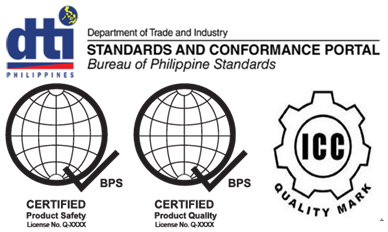Introduction to Philippine PS/ICC certification
Under the provisions of the Philippine Consumer Code, part of the responsibilities of the Bureau of Philippine Standards (BPS) is to protect consumers from health and safety hazards and to assure the public of the consistency of standardized products in the market. To fulfill this responsibility, the Bureau provides for the standardization and certification of locally manufactured and imported products so that consumers have access to quality and safe products that comply with relevant Philippine National Standards (PNS).
Currently, BPS implements two compulsory product certification programs: Safety Certification Mark Licensing Program (Philippine Standard (PS) Quality) and Imported Commodity Clearance (ICC) Certification Program. Products covered by compulsory certification, whether locally manufactured or imported, may not be sold in the Philippine market if the product does not have the PS or ICC mark.
Safety Certification Mark License (PS) is awarded to local or foreign manufacturers that comply with PNS ISO9001 and related product standards. At the same time, ICC certificates are issued to importers whose imported products comply with relevant PNS regulations. Without the necessary PS or ICC marks, they are not allowed to be sold in the Philippine market.
Currently, BPS’s mandatory product certification program covers eighty-seven products and systems. They are divided into three main product groups, namely electrical and electronic products, machinery/construction and construction materials, and chemicals and other consumer goods.
Philippines PS certification application process
- The applicant submits an application to BPS.
- BPS reviews documents and accepts applications.
- BPS arranges factory audits and conducts product sampling.
- Arrange the product to be tested at BPSTL, and BPSTL will issue a test report after the test is completed.
- BPS reviews product test reports, technical documents, and factory audit reports.
- After the review is completed, BPS issues the PS certificate.
Factories need to meet ISO9001 system requirements. Product testing is usually arranged at the BPSTL laboratory. The PS certificate is valid for 3 years. Within 3 years, the applicant can make unlimited shipments.
After the applicant obtains the PS certificate, it must apply the PS mark on the product within the validity period.
The application process for ICC certification is:
- The importer applies to BPS.
- BPS reviews documents and accepts applications.
- BPS issues a release letter.
- If the importer cannot provide a test report, BPS will send personnel to inspect and take samples, and the samples will be sent to a BPS accredited laboratory for testing. If the importer provides a test report, submit the test report to BPS.
- BPS audit report and product technical documents.
- After the review is completed, BPS issues the ICC certificate.
The ICC certificate is valid for batches and needs to be applied for every shipment.
After the applicant obtains the ICC certificate, it needs to purchase an ICC sticker from BPS.

Bureau of Philippine Standards
Philippines ICC certification rules and procedures:
For the PS system, when a product meets the corresponding Philippine national standards after review, the Philippine Bureau of Product Standards (BPS) will issue a license to the manufacturer of the product to allow it to use the PS mark. When the imported product falls within the scope of compulsory product certification and the Philippines has the corresponding national standard (PNS) for the product, the imported product has been evaluated by BPS (imported products are subject to sampling testing) and meets the corresponding standard requirements, BPS will give The importer of the product issues an ICC license, allowing it to use the ICC mark and clear customs. The basic procedures for applying for the ICC/PS mark are as follows:
(1) Submit an application to the Philippine Bureau of Product Standards (BPS);
(2) Factory system review;
(3) Product testing/inspection;
(4) Issuance of certificates and subsequent supervision and review.
Philippines ICC compulsory certification products
(1) Household appliances (air conditioners, fans, immersed water heaters, kitchen equipment (mixers, egg beaters, etc.) refrigerators, washing machines, etc.;
(2) Lamps and related products (fluorescent lamps, incandescent lamps, lamp holders, ballasts, Christmas lights/light strings, starters, etc.);
(3) Wiring devices (circuit breakers, metal wire junction boxes, plugs and sockets, PVC tape, switches); wires and cables (PVC soft wires, thermoplastic wires and cables);
(4) Machinery/building materials (cement, steel pipes, ceramic tiles, iron sheets, flat glass, water pipes, pipe fittings, toilets, bathtubs, water tanks, washbasins, iron wire;
(5) Chemical and other products (fire extinguishers, lighters, single chairs/stools, brake fluid, gas stoves, vehicle inner tubes, lead-acid batteries, matches, seat belts (seat belts) (windshields, rear lights, side seats , car tires).

certifications you must know
ICC certification cycle:
The Philippines ICC certification cycle, based on the actual data preparation situation, if the application materials are complete and the products exported by the manufacturer or foreign trader have qualified test reports, the certification cycle will take about 15 working days.
If there is no test report, the cycle will definitely increase accordingly. In addition to the above cycle, the product test cycle will be added. Generally, the test will take more than 15-20 days, and the test cycle will be different depending on different products.
Therefore, manufacturers and foreign traders who need to export to the Philippines need to confirm the shipping time in advance to avoid unnecessary economic losses.

